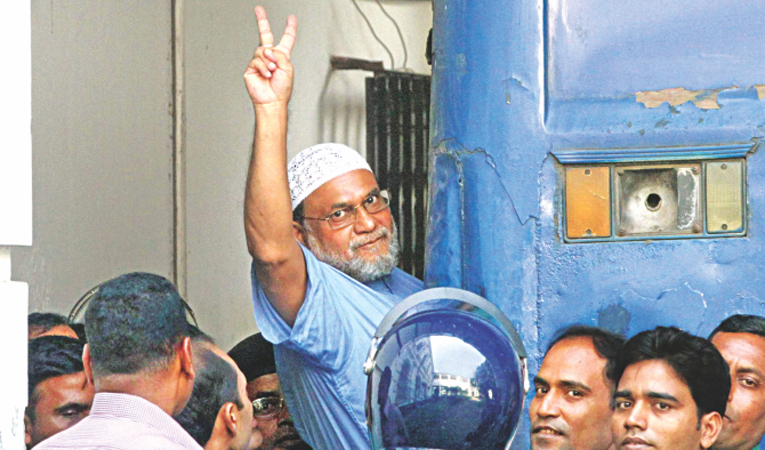Last month, police had arrested thirteen more accused of war crimes in Bangladesh for alleged crimes during the 1971 war. Since its establishment, the international crimes tribunal Bangladesh has been criticised for being used against the opposition parties under the pretext of prosecuting so-called war crimes. A panoptic historical timeline would help the reader understand how the Bangladeshi govt. has used the 1971 volatile political sentiments of the public for two reasons; to achieve the justification for the prosecution of war criminals along with its initiation process and its ulterior political motives.
After the separation, Sheikh Mujibur Rahman, the provisional President of separated East Pakistan, announced that two sets of trials, one for local collaborators and the other for the Pakistani accused. On January 24, 1972, without the involvement of parliament, Sheikh Mujibur Rahman issued a Presidential order entitled Bangladesh Collaborators Order 1972. It was solely designed to charge those who aided the Pakistan Army during the war. By the virtue of Article 5 (1) of the Collaborators Order 1972, 73 special tribunals were established to try locals who supported the Pakistani authorities during the 1971 war. Although little reliable data is available on the initial trials of 1972. An international lawyer and academician, Suzannah Linton, states that accounts of trials occurring under the Collaborators Order are contradictory.
The establishment of the war crimes tribunal was interpreted as an effort to put diplomatic pressure on Pakistan to recognise newly-formed Bangladesh
In 1972, under the Collaborators Order, more than 40,000 people were arrested and accused of war crimes. Around 20,000 of these were charged and taken into custody. 752 of them were convicted but later released by the general amnesty declared by the Prime Minister Sheikh Mujeebur Rehman. On November 30, 1973, as a result of the proclamation of general amnesty, thousands of people were released. Later, on December 31, 1975, General Ziaur Rehman repealed the Collaborators Order.
Presumably, the Bangladeshi Government recognised its lack of expertise and feared international pressure in case miscarriage of justice occurred during prosecution of the thousands of so-called collaborators, particularly given that its status as a sovereign state had not at that time been confirmed by a majority of states and by the UN. In the context of the Triparty agreement, apparently, on that time, Sheikh Mujib was using the war crimes tribunal as a bargaining chip employed in talks regarding the establishment of diplomatic negotiations with the Pakistani Government.

The amnesty given by the Indemnity Order of 1973 covered the same categories of crime for which those who collaborated with the army could still face punishment. Human rights activist Mr Geoffrey Robertson rightly noted that “it laid down a dubious legal basis, very apparent in the current trials, for ‘victor’s justice:’ those on the right side of history would be pardoned for their war crimes, whilst those who fought for a united Pakistan would be treated as traitors.”
Following the War Crimes Tribunal Order of 1972, to provide a legal framework for the prosecution of 195 Pakistani soldiers, on July 20, 1973, the Bangladeshi Parliament passed the International Crimes Tribunal Act, 1973. 1973 marked the year when ICTA was adopted. Unlike the Collaborators Act, the ICTA of 1973 was not bound by the Code of Criminal Procedure and Rules of Evidence under the Evidence Act.
As mentioned earlier, the establishment of the war crimes tribunal was interpreted as an effort to put diplomatic pressure on Pakistan to recognise newly-formed Bangladesh. Therefore, after the Tri-Party agreement of 1974, Bangladesh agreed to repatriate the 195 suspects to Pakistan without trial.
Following the general amnesties given by the Bangladeshi government, the 1974 Tri-Party Agreement (Shimla Agreement) was considered to be a significant politico-legal compromise. By the virtue of the agreement, all prisoners of war were released by both sides. The agreement was signed on April 9, 1974. The Tri-Party agreement helped Bangladesh to regularise its diplomatic ties with Pakistan and resulted in the recognition of Bangladesh as a sovereign state. Many experts rightly have argued that the actual reason for the prolonged detention of POWs was to force Pakistan to recognise Bangladesh. In return, Bangladesh dropped the war crime charges against the POWs in its custody. Contrary to Bangladeshi claims, there was no legal obligation imposed on Pakistan to act against the 195 suspects.
In 2009, four decades later, the Awami League Government re-established the International Crime Tribunal (ICTB) as promised in its election campaign. After gaining office, Sheikh Hasina’s government established the ICT-1 and the ICT-2 working under special rules of procedure and are not bound by the General Evidence Act of Bangladesh and the Bangladeshi Code of Criminal Procedure, which guarantees a fair trial.
The historical background of the legal developments of the ICTB clearly suggests that the war crime trial proceedings were primarily initiated to put diplomatic and political pressure on the Pakistan government to accept Bangladesh. Therefore, by forgoing the trial planned for the Pakistani POWs, Sheikh Mujibur Rehman achieved recognition for Bangladesh as a sovereign state and gained a seat at the United Nations. It is a matter of great significance that unlike the Collaborators Order, the ICTA was not repealed, which opened the door to its current use by Sheikh Hasina’s government. Although Sheikh Mujibur Rehman pronounced a general amnesty many years ago, the Hasina regime is still using old tactics for her political gains.
The writer is currently based in Kuala Lumpur and holds a PhD in International Law from Malaysia